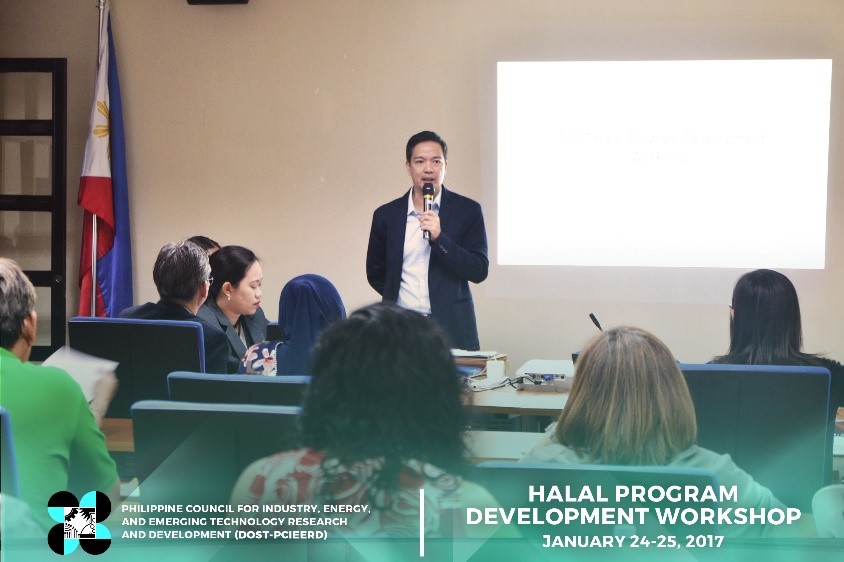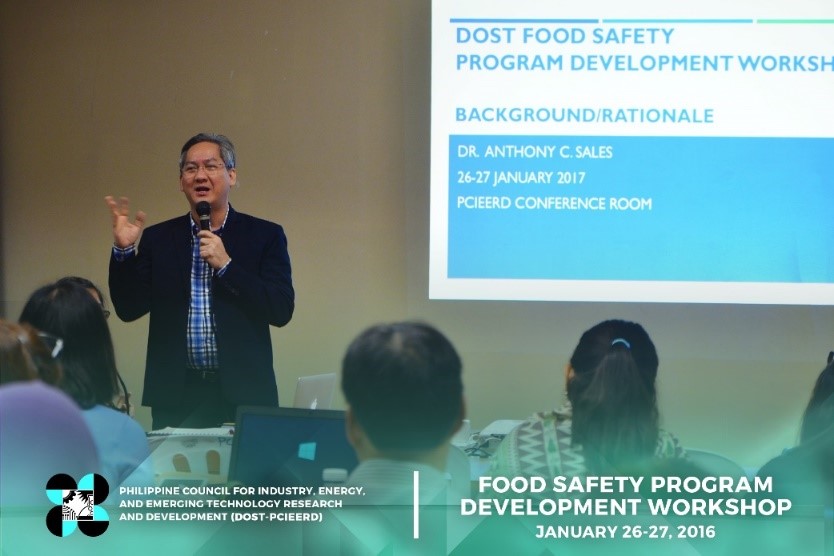TAGUIG CITY—The Philippine Council for Industry, Energy and Emerging Technology Research and Development (PCIEERD) conducted development workshops on Halal and Food Safety Programs from January 24-27, 2017.
The participants were divided into four program areas—research and development (R&D), laboratory testing, human resource development, and technology transfer. The groups were expected to deliver program and project proposals at the end of each workshop.
Halal Program Development Workshop

PCIEERD Executive Director Dr. Carlos Primo David delivering the opening remarks during the Halal Program Development Workshop last Jan. 24-27.
The Halal Program Development Workshop was held on January 24-25 with participants from the Halal Program Committee and representatives from State Universities and Colleges involved in research and development in Halal Mindanao.
The Halal Program Committee established a vision of a ‘globally competitive Philippine Halal industry empowered by science, technology, and innovation’ and aimed to create a roadmap for Halal Industry from 2017-2022 with RA 10817 as its legal framework.
[Republic Act 10817 is the Act Instituting the Philippine Halal Export Development and Promotion Program, Creating for the Purpose of the Philippine Halal Export Development and Promotion Board, and for other Purposes]
The R&D group came up with projects on food and feed production, cosmetics and toiletries, and pharmaceuticals wherein they would focus on protocols of production, quality evaluation, and supply chain studies.
Methods for enhancing the Halal Verification capabilities were proposed by the Laboratory Testing group such as capacity building, creation of technical working group, and policy advocacy.
Meanwhile, the projects presented by the Human Resource Development included training needs assessment, development of curricular programs and courses for Halal Science, and capacity building for different stakeholders.
Lastly, Technology Transfer and Extension group suggested the establishment of a Halal Knowledge Center, advocacy drive campaign on the science and technology of Halal, and putting up an innovation system support for Halal micro, small, and medium enterprises (MSMEs).
Halal refers to products, food or non-food commodities, that are permissible under Sharia’h or Islamic Law.
Food Safety Development Workshop

DOST XI Director Dr. Anthony Sales giving the background and rationale for the Food Safety Development Workshop on Jan. 26-27, 2017.
On January 26-27, PCIEERD then organized a Food Safety Development Workshop attended by over 50 participants from different DOST councils and attached agencies.
This two-day workshop is directed to the vision of ‘safe food for everyone, by everyone, through science, technology, and innovation’ in support to Republic Act 10611.
[RA 10611 is an act to strengthen the food safety regulatory system in the country to protect consumer health and facilitate market access of local foods and food products, and for other purposes]
DOST Region XI Director, Dr. Anthony Sales discussed the rationale of the activity citing the increasing number of food- and water-borne illnesses and the emergence of pathogens. He then mentioned the existing programs on Food Safety, and RA 10611 and the duties and responsibilities for DOST.
The group on R&D came up with three programs to support: Risk Assessment of Contaminants that included profiling of R&D studies and development of antimicrobial resistance; Total Diet Studies—an approach to identify, estimate, and evaluate potential food safety risks; and MSMEs/informal sector to conduct activities to upgrade their capabilities, assure safety of foods for consumer protection, and increase their compliance to food safety.
The Laboratory Testing group focused on ways to enhance the testing capabilities for food safety. Projects presented include acquisition of new testing facilities/services, development of systems and protocols for new services developed, and integration of new testing services/parameters in the OneLab System.
Meanwhile, accreditation by Food Safety Regulation Agency (FSRA), inclusion of Harmonized Food Safety Modules in TESDA's existing food-related courses, capability building for researchers and lab analysts, and forging linkages and networks locally and internationally are the projects proposed by the Human Resources Development group.
Finally, the following are the projects presented by the Technology Transfer group: development of harmonized training modules, awareness training for MSMEs, establishment of grading systems for food business operators, strengthening DOST Food Safety advocacy and promotion, and development of guidelines on the use of DOST logo for DOST-assisted food products.
In his opening remarks, PCIEERD Executive Director, Dr. Carlos Primo David emphasized the importance of sustainability of research and development programs during the workshops, and that R&Ds that are not sustained become burden to the Filipino people. He hoped that the programs that will arise can eventually be sustainable even without government subsidy.
Moreover, Dr. Rowena Guevara, DOST Undersecretary for Research and Development, emphasized the need to ensure alignment and integration of the Food Safety Program with the programs of food safety regulatory agencies such DOH, DA, and DILG to rationalize efforts of the government. Other stakeholders such as DTI and the private sector should also be invited to be part of the Program Advisory Group.





